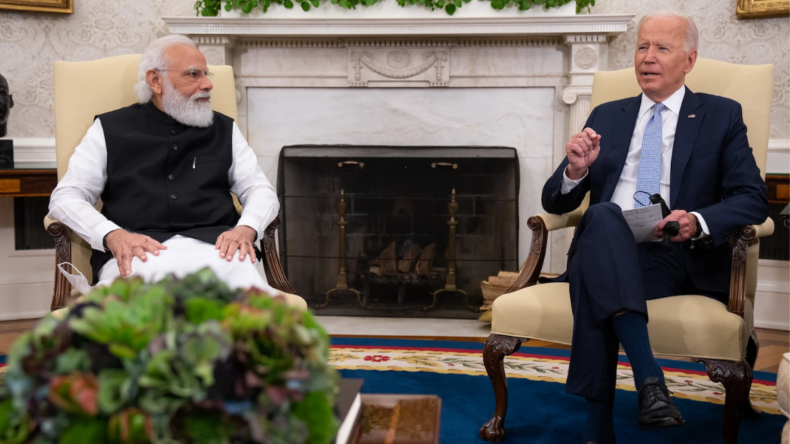It further stated that India and the United States would maintain “tight communication” to ensure that there is a shared understanding of the respective obligations and that any subsequent disagreements on this topic be handled via constructive discourse.
According to the ministry, the full provisions of the deal will be finalized by February 1, 2022,
“Under this contract, and consistent with and applying the same terms as previous agreements with Austria, France, Italy, Spain, the United Kingdom, and Turkey, account from India’s equalization levy on e-commerce number of sets that US companies are accruing in India during the interim period will be creditable against future taxes accrued under Pillar 1 of the OECD agreement in defined conditions.”

“However, the credit will accumulate from April 1, 2022, until either the implementation of Pillar 1 or March 31, 2024 (whichever comes first) “According to a statement issued by the USTR”.
According to the statement, the US would lift the presently suspended extra taxes on Indian imports imposed as part of the DST Section 301 inquiry.
The message went on to say that USTR was taking the legal measures necessary to end the Section 301 trade action and that it will continue to monitor the execution of the agreement in collaboration with the Treasury.
“The India-US agreement on a transitional approach benefits India since it can continue with the current 2% levy with the assurance until Pillar 1 takes effect,” said Amit Maheshwari, tax partner at tax and consultancy firm AKM Global.
The 2% equalization charge will have to be repealed once the OECD accord is implemented, and that also applies to other nations that have enacted a similar tax.
According to the parameters agreed upon by five nations in the October 21 agreement, India will be required to grant credit if the tax collected throughout this period is greater than the amount collected when the OECD regime goes into effect for a comparable period.
On 19th November, Prime Minister Narendra Modi announced that all three farm laws would be withdrawn after a massive protest from farmers, mainly from Punjab and Haryana, on the borders of Delhi for more than a year.
The opposition political leaders welcomed this decision with massive celebrations, but they didn’t criticize it.
The opposition leaders said that the BJP-led Union government only bowed to the farmers’ demands, who have been protesting against the laws for more than a year, due to the impending elections in five states, including Uttar Pradesh and Punjab.
They also mentioned that the decision came after “more than 700 farmers died” during the protests.
The Opposition leader believes that the protests have raised the political costs for the BJP, and the party needed to act before it became too costly, particularly in Uttar Pradesh. In reaction to the announcement, Congress leader Rahul Gandhi tweeted that the arrogant government finally had to bow to the Satyagraha or struggle of the farmers.
The Congress is the ruling party in Punjab, where the earliest protests against the laws began with the blockade of trains last year. The Deputy leader of the Congress Party in the Rajya Sabha, Anand Sharma, said that “Truth and justice prevailed and the farmers’ protests vindicated.
If the government didn’t bypass the parliament scrutiny and excluded stakeholders from consultations, the pain, and suffering of the farmers and the loss of lives could have been avoided.”
Senior Congress leader P. Chidambaram said, “What cannot be achieved by democratic protests can be achieved by the fear of impending elections.” He also added that the prime minister’s announcement on the withdrawal of the three farm laws is not a policy change; it is urged by fear of elections.
“Anyway, it is a great victory for the farmers and the Congress party which was unwavering in opposition to the farm laws,” Chidambaram also said. Delhi Chief Minister and Aam Aadmi Party (AAP) leader Arvind Kejriwal said he was happy to hear good news on Prakash Divas.
However, he added that over 700 farmers died over the past year and said generations would remember how the farmers put their lives at risk to protect their interests.
On Friday, West Bengal chief minister Mamata Banerjee congratulated farmers for their relentless fight against three farm laws and said they were not fazed by the “cruelty” of the BJP.
She tweeted that “My heartfelt congratulations to every single farmer who fought continuously and were not afraid by the cruelty with which @BJP4India treated you. This is YOUR VICTORY! My deepest condolences to those farmers who lost their lives in this protest. #FarmLaws.”
Yashwant Sinha, former BJP leader congratulated the farmers, adding that he will not attach any “noble sentiment” to the government’s move. It is a calculated step before the Uttar Pradesh elections, Sinha said, adding that for this government, “democracy begins and ends with elections”.
CPI (Marxist) general secretary Sitaram Yechury saluted the farmers for their “brave struggle”, crediting them with forcing the Modi government to repeal the three farm laws. ” We should not forget the sacrifice of more than 750 farmers who have lost their lives in this struggle. They are our martyrs.
The quest for justice for those targeted by the government and its agencies through false cases will continue,” he said. Meanwhile, some farmer leaders have also lamented that the Union government delayed the decision to repeal the farm laws, which led to many farmers losing their lives unnecessarily.
Farmer leader Avik Saha was quoted as saying: “Very late at the cost of 700+ farmers. An unfortunate thing for us to note is that government still doesn’t concede that this was an anti-farmer, pro-corporate legislation; maybe this is a temporary truce.”













